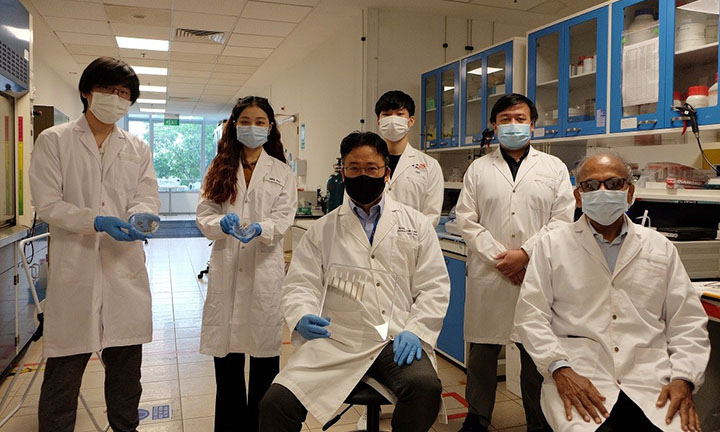A self-folding plant-based material that could form 'intelligent' green products – Professor Subra Suresh and Professor Cho Nam-Joon
We are delighted to share the research achievement of Professor Subra Suresh, Professor Cho Nam-Joon and team, which has been featured in various media.
Combining sunflower pollen with printer toner, the research team have developed a paperlike material that is able to fold itself into new shapes in response to environmental humidity.
Patterns digitally printed on the pollen paper using a commercial laser printer, determine the three-dimensional shape the paper folds into. The process is reversible but can be "frozen" if a layer of chitosan (a natural sugar found in shellfish) is applied onto the structure.
They demonstrated their method, by creating several geometrical configurations, from straws and boxes to more complex forms like a 3D paper orchid.
The printed pollen paper’s ability to fold into 3D configurations demonstrates its potential for use in ‘intelligent’ green products such as self-folding envelopes, boxes, and food containers.
The material also has the potential to be used in 'origami robots' – flat sheets that can fold autonomously into 3D shapes – for electronic and biomedical applications with special shape requirements, shape-dependent tissue engineering, and stimuli-triggered drug delivery.
NTU Distinguished University Professor Subra Suresh said: "Building on our earlier studies on the unique properties of pollen, we combined easy-to-process pollen grains and cost-effective digital printing to develop a moisture-sensitive biomaterial based system that can morph on demand into geometrical configurations that lead to complex shapes depending on the patterns we print. “Through computational simulations, we also modelled and predicted transformations of the material using various printed patterns and in response to various levels of humidity. This helped us to develop a general framework for materials and geometry design to produce highly controllable shape-morphing natural materials in a scalable and sustainable manner."
Professor Cho Nam-Joon said: “In this work, we demonstrated how economical and eco-friendly plant-based materials and readily available printing technologies could be utilised to produce autonomous, on-demand deformation and designing complex shapes. By automating the folding process through controlling environmental humidity, origami-inspired machines can be produced without manual folding, reducing the skill and time necessary for fabrication.”

Prof Cho (third from the left, sitting), Prof Suresh (first on the right, sitting) and their research team. Source: NTU
The breakthrough research was published in the peer-reviewed scientific journal Proceedings of the National Academy of Sciences of the United States of America (PNAS), with the title "Digital printing of shape-morphing natural materials". The research article can be found via this link: https://doi.org/10.1073/pnas.2113715118. The research team has also filed a patent application for potential commercialisation of the technology.
Our heartiest congratulations to Prof Suresh, Prof Cho and team on the excellent achievement!
Media Coverage:














/enri-thumbnails/careeropportunities1f0caf1c-a12d-479c-be7c-3c04e085c617.tmb-mega-menu.jpg?Culture=en&sfvrsn=d7261e3b_1)

/cradle-thumbnails/research-capabilities1516d0ba63aa44f0b4ee77a8c05263b2.tmb-mega-menu.jpg?Culture=en&sfvrsn=1bc94f8_1)

7e6fdc03-9018-4d08-9a98-8a21acbc37ba.tmb-mega-menu.jpg?Culture=en&sfvrsn=7deaf618_1)




.tmb-listing.jpg?Culture=en&sfvrsn=db3c4417_1)

